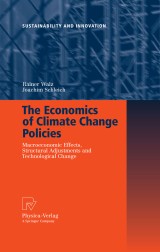Details

The Economics of Climate Change Policies
Macroeconomic Effects, Structural Adjustments and Technological ChangeSustainability and Innovation
|
96,29 € |
|
| Verlag: | Physica-Verlag |
| Format: | |
| Veröffentl.: | 27.09.2008 |
| ISBN/EAN: | 9783790820782 |
| Sprache: | englisch |
| Anzahl Seiten: | 170 |
Dieses eBook enthält ein Wasserzeichen.
Beschreibungen
In its latest Assessment Report, the Intergovernmental Panel on Climate Change (IPCC, 2007) projects that without further action the global average surface t- perature would rise by a further 1. 8–4. 0°C until the end of this century. But even if the rise in temperature could be limited to the lower end of this range, irreversible and possibly catastrophic changes are likely to occur. Consequently, the protection of the earth’s atmosphere requires substantial efforts to reduce CO and other green- 2 house gas emissions – especially in countries with very high per capita emissions. To limit the imminent rise in temperature, in the Kyoto-Protocol, the European Union has committed itself to reducing the emissions of greenhouse gases by 8% up to 2008–2012 compared to 1990 levels. Within the EU burden sharing agr- ment, some countries have to achieve even higher emissions reductions. Germany was assigned a reduction target of 21%. The entry into force of the Kyoto Protocol in February 2005 marks a first step towards meting global climate targets, but more ambitious action to reduce greenhouse gas emissions is needed after 2012, when the Kyoto targets expire. Under German presidency, the EU has committed itself to unilaterally reduce its greenhouse gas emissions until 2020 by 20%. In case a Post- Kyoto agreement can be reached, the EU reduction target would be 30% (CEU, 2007).
Effects of Climate Policy on the Economy: A Theoretical Perspective.- Empirical Results of the Macroeconomic Impacts.- Structural Adjustments.- Theoretical Approaches and the State-of-the-Art in Accounting for Technological Change.- Technological Change and Energy Consumption in Energy Intensive Industry.- Barriers to the Diffusion of Energy Efficiency in the German Commercial and Services Sectors.- Innovation Effects of Regulation – Case Study for Wind Energy.- Summary and Conclusions.
<P>The protection of the earth's atmosphere requires substantial efforts to reduce CO<SUB>2</SUB> and other greenhouse gas emissions. In order to meet these targets, governments have started to implement climate policies which include informational measures such as demonstration programmes as well as economic instruments such as energy or emission taxes, emission trading schemes, efficiency standards and labelling systems for appliances, and subsidies for low- or no-carbon technologies such as renewable energy sources. This book presents a highly policy-relevant overview of the likely macroeconomic effects of climate change policy. It portrays the current debate and analyses the modelling results of existing studies. The authors also present their own empirical results which contribute to closing the gap with regard to structural effects and impacts on technological change of climate change policies.</P>
Includes supplementary material: sn.pub/extras
Diese Produkte könnten Sie auch interessieren:

A Sea Change: The Exclusive Economic Zone and Governance Institutions for Living Marine Resources

von: Syma A. Ebbin, Alf H. Hoel, Are Sydnes

96,29 €















